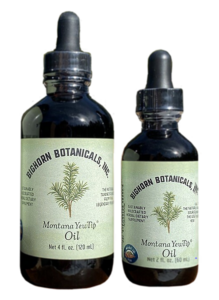The forests of the Pacific Northwest are home to many healing trees that can help keep us healthy. For a long time, people have used these trees to treat different health problems. From boosting your immune system to helping with cuts and scrapes, these trees offer natural remedies. Let’s look at some of the trees and how they can help.
Pacific Yew Tree
The Pacific yew tree is famous for producing Taxol, a powerful medicine used to treat cancer.
Taxol: This chemical is used to treat several types of cancer, like breast, lung, and ovarian cancer. Even though the tree was nearly over-harvested, scientists found a way to make synthetic Taxol to save the tree.
Perhaps the best Pacific Yew Trees are found in Northwestern Montana and Northeastern Idaho. Bighorn Botanicals in Montana sustainably harvests these trees for their yew tips.
In the past, pharmaceutical companies used Montana yew tips to extract Taxol, a compound needed for cancer treatments. However, they eventually created an artificial, patentable version of Taxol, allowing them to charge the big bucks.
Anyone can still order the real yew tips for personal use or visit the Bio-Medical Center in Tijuana, which specializes in alternative therapies. They offer natural Taxol from Montana yew tips to treat cancer and other health conditions.
It’s important to remember that nature includes companion healing compounds in all its remedies. These natural healing components are often missing in the artificial chemical lookalikes, so complete healing is unlikely.
Pine Trees
Pine trees are common in the Pacific Northwest, and their needles have a lot of Vitamin C. This makes pine needle tea a great way to support your health.
Pine Needle Tea: Drinking pine needle tea is good for your immune system and can help with colds and breathing problems. It’s packed with Vitamin C and can even help fight off scurvy, a sickness caused by insufficient Vitamin C. Some people believe it might also help with COVID-19 symptoms.
Pine needle tea might help with problems caused by the V-Serum and current spike protein issues. Some people say this tea can help with COVID-19 symptoms. Dr. Judy Mikovitz found that pine needle tea might stop specific problems caused by mRNA and spike proteins in COVID-19 tests and vaccines. These problems include damage to Chromosome 8, which affects intelligence, and changes to DNA.
A special RIFE frequency equivalent to 528 Hz, which can be found in certain music or a tuning fork, can also help fix DNA. Pine needle tea is cheaper and easy to get. If you had a COVID-19 test or vaccine, you might want to drink this tea every day. Keep it in the fridge to stay fresh.
Wound Healing: Pine sap can quickly heal cuts and wounds. It also works like a natural bandage to protect against infections.
White Pine
White pine tips can be used to make a powerful tea. The more bitter the tea, the more terpenes it has, which are good for detoxing the body. This tea is rich in vitamins and is good for fighting off colds.
Scots Pine
The Scots pine tree has parts that can help clear out mucus and kill germs. It’s great for making cough remedies.
Cedar Trees
Cedar trees are extraordinary, especially to Native tribes in the Pacific Northwest. These trees are used in ceremonies and have many healing benefits.
Cedar Tea: Cedar tea helps treat colds, fevers, and body aches. It contains Vitamin C and electrolytes, making it a natural energy booster. Native people also used cedar to fight off hunger and thirst.
Western Red Cedar: The oils from this cedar protect against viruses, bacteria, and fungi. These oils can be used in creams for skin infections or warts. It also helps boost the immune system by encouraging your body to fight infections.
Spruce Trees
Spruce trees offer several natural remedies, especially from their sticky resin.
Spruce Resin: The resin from spruce trees can be applied directly to cuts and insect bites to prevent infections. Mixing it with olive oil makes a great natural medicine for the skin.
Spruce Needle Oil: You can make spruce needle oil by soaking the needles in olive oil. This oil smells refreshing and can be rubbed on sore muscles.
Douglas Fir
Douglas fir trees also offer natural health benefits, especially through their fresh spring tips.
Douglas Fir Tea: The green tips that grow in the spring are full of Vitamin C. Tea made from these tips helps with sore throats, coughs, and colds.
Topical Uses: Douglas fir pitch can be used on the skin to soothe irritation and help with minor wounds.
Cottonwood Trees
Cottonwood trees have special buds that are used to make healing salves.
Cottonwood Bud Salve: The buds can be turned into a salve (a kind of healing cream) to ease pain from arthritis and other injuries. The salve also fights infections and helps wounds heal faster.
Red Alder
Red alder trees are known for treating lung problems.
Respiratory Health: Native people used red alder to treat tuberculosis and other breathing issues. The bark is also strong enough to fight off infections.
Healing Tree Herbal Extraction
You can use oils, alcohol, or DMSO to extract and concentrate the healing properties of the herbs. Many herbal publications, including YouTube, show you how to use alcohol and oils. The book DMSO for Humans explains how to make non-toxic extracts that are supercharged for topical application and penetration using DMSO.
The trees in the Pacific Northwest are more than just beautiful—they’re also powerful healers. From pine needles that boost your immune system to cedar that fights off infections, these trees provide natural remedies that have been trusted for generations.



